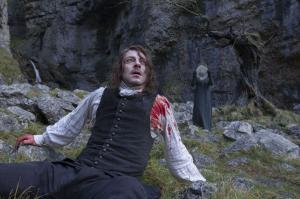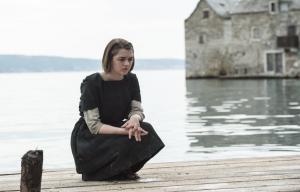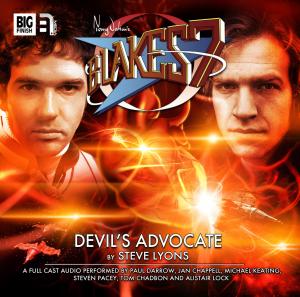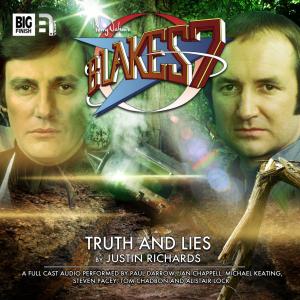Game Of Thrones Season Five - Episodes Five And Six
Tuesday, 16 June 2015 - Reviewed by
 5- Kill the Boy, 6 - Unbowed, Unbent, Unbroken
5- Kill the Boy, 6 - Unbowed, Unbent, Unbroken HBO/ Sky Atlantic - 2015
Kill The Boy is a title with several references to actions and decision. Most obvious is Jon Snow's growth as the Lord Commander, telegraphed by Maester Aemon uttering the phrase. Tormund is now truly developing respect for Jon, after already having been through a period of investing trust in the youth, only to have it damaged by the eventual actions of one who meant his sworn loyalty to the Night's Watch.
There is some build up to the Hardhome set piece, which was a major event in the books, albeit one that never took place in the present. Jon needs Stannis to lend him ships for this controversial and risky mission. Enough good-will means that his wish is granted.
A rather more ham-fisted development sees Olly continue to despise the Wildlings after he lost his village to their attack. I wish I could assert that he is anything more than a thinly characterised and blandly acted entity. The Jon Snow storyline overall though continues to be both compelling and enjoyable. Despite his resolution in executing Slynt, he still has much to prove to his Brothers in Black, as he is distinctly youthful, and happened to break a clutch of vows not that long ago.
In the much warmer climes of Meereen, we quickly find out that Barristan Selmy is indeed deceased, following his one last show of fighting skill against the massive group of ne'er-do-wells.
Grey Worm though has just managed to escape death's door and is nursed back to some semblance of health by Missandei. I find this work featuring new characters to be quite shallow and underwhelming. The acting is fine here, but there just is no real reason to care about two stereotypes' relations, when their past and deeper thoughts can only be guessed at.
However, I do find an improvement in the one on one dynamic of the Khaleesi and Missandei. Dany struggles to make decisions with two major players now gone from her own 'Small Council' - one exiled by her and the other slain by the rebellious Sons of the Harpies. Thus she has need of another young woman's opionon. Some off-screen connection between the two actresses may be playing out in a positive way now on-screen.
But the most arresting scene of episode five concerning the Targaryen Queen is when she scares major nobles of Meereen, by feeding one of them alive to her entrapped dragons. It truly is a standout visual moment, as the hapless man is burnt and torn to bits. Perhaps this is due to her anger over losing Selmy, or just knowing she has some major trump cards in her fire-breathing 'kin'. Also powerful is the about-turn when the Queen allows Hizdahr zo Loraq to be her intended - not out of love, but political expediency. He certainly has endured a memorable few hours, but will he still have a chance to assert authority as he did before Meereen was overthrown?
Jorah may be exiled, but he proceeds ever closer back to the Queen - with Tyrion in tow. A wonderful bit of poetry plays out as both men muse on the rich history of the land they are passing through. Also striking is the surprise appearance of Drogon flying far above the river they are on; seemingly disinterested in these desperate men.And come the bridge between these two episodes, Mormont is suddenly exposed to his first real danger in a long time.
Firstly he makes the mistake of passing through old Valyria, and thus being exposed to attack by Stone Men. He manages to save Tyrion and himself, at the cost of getting infected with greyscale. The question now stands as to how long Jorah can keep this hidden. Also will he will infect anyone else and to what extent?
Secondly in losing their boat, the two men are forced to eat humbly as they march on the long road towards the City of Pyramids. Tyrion reveals that Jorah's father, the-then-Commander of the Watch, was murdered some time ago by mutineers. Tyrion also establishes that he was driven to kill Tywin after the betrayal with Shae. Mormont's actual opinion of this crime is not touched upon - a fine example of less-is-more writing by Bryan Cogman.
Despite this plotline being strong, a slight hiccup occurs when the duo are overcome by stealthy pirates/slavers. One would expect them to be more careful than they end up being. Thankfully the Imp rescues the scene by using a bit of ingenious logic that he should be intact for verification. It also cleverly makes the glib remark about his 'dwarf manhood' in episode three now look a little careless. Jorah needs no such cunning. Season trailers have depicted Jorah in a fighting arena, so it would appear that he will have a chance to prove how able a warrior he is, despite his grizzled old exterior.
Stannis, his court and army have plenty to do at the Wall in before marching away to deal with the Bolton 'obstacle' that blocks the capital, in episode five. It seems they will not return until a week or two's absence from our side. In the lead-up there is a well-performed scene where Samwell reverently greets the 'Baratheon King'.
He commandingly encourages Sam to carry on finding out as much as he can on dragon-glass and other methods of defence against the Others. Also Sam's relationship with Gilly has been portrayed very well once again throughout this latest season, the chemistry between John Bradley and Hannah Murrah being truly endearing.
These two instalments also perform a welcome character exploration of the twisted 'father and son' duo that is Roose and Ramsey. Just as with Tyrion and Jorah, the casting and acting is stellar, although they are instead meant as figures of contempt. Initially Ramsey seems to have command of those seated at the dinner table, and makes Sansa and Reek suffer equally by forcing a 'reconciliation'. But this is overshadowed by Roose's carefree revelation that he is expecting a child with Walda, clearly hoping for another male heir. The earlier excitement Ramsey demonstrated when holding his (nude) lover Myranda and reminding her he must marry someone of similar status is suddenly undercut.
And there is more. Roose explains later to his 'now-legitimate' son the exact circumstances as to how he was conceived. Ramsey's mother was forced to see her lover killed, moments before being assaulted by Bolton; the end-product being this sadist of a man. This theme of women being treated as objects is an uncomfortable one, but Thrones is based on such real life time zones as the War of the Roses where such barbarism was still common in real-life history.
All the same, the final moments of Unbowed, Unbent, Unbroken make that episode title seem a misnomer. Sansa, now-married, quickly suffers a terrible fate. She may have dreamed once long ago of giving her maidenhood to a virtuous man of good title. Such hopes have disappeared with the last of autumn though.The ultimate indignity of Ramsey taking her innocence in a derogatory and humiliating fashion is worsened, as eunuch Theon is ordered to watch the act throughout. Whether this is because Ramsey was not satisfied with 'Reek's apology at dinner or just another way of torturing his 'plaything' is left open to discussion. Of course the main thoughts evoked as the closing credits come on with sad music are those of sheer disbelief and horror. Sophie Turner warned viewers some time earlier of an upsetting scene, and she was not misleading anyone.

This is all the indirect work of Littlefinger abandoning Sansa to the mercies of the Boltons. We only find out what is happening with this schemer in episode six, as King's Landing is given a rest for one week. Baelish does indeed meet with Cersei as expected. He quickly shows a new approach in giving away Sansa's location and 'her actions' in siding with the Boltons. Given Littlefinger's seemingly deep love for Catelyn this surprises, but how much he means it is anyone's guess. He does placate Cersei's dark thoughts of revenge on the 'last 'of the Starks, by promising Sansa's head on a spike. But could this be done by someone else first, given the impending battle at Winterfell?
In one of the few truly funny moments of late, we have fan-favourite Olenna Tyrell return to court intrigue, as she curses the stench of King's Landing on the road leading to the city. An enjoyable verbal clash soon ensues as she denounces the Queen Mother as a 'Tart', upon being referred to as the 'Tart-tongued Queen of Thorns'. But Cersei is playing her cards just right perhaps.
Despite both Margaery and Olenna's calm when Loras is forced to answer questions in a small enquiry run by the High Sparrow, a sudden turn of events sees trouble loom. Olyvar, the man who helped run Baelish's brothels until recently, testifies against Loras and gives enough evidence to satisfy the religious order that a full trial is justified. The precise detail could only have been known by someone who lay with Loras, and as we know from earlier episodes this union has happened quite a few times. Margaery puts herself in a corner by indirectly conceding she was aware of these actions, and is arrested for trial as well. This is one of the strongest King's Landings moments all season. Tommen is confirmed further as a weak boy, letting Cersei orchestrate the whole thing from start to finish. And at the risk of repeating myself, Jonathan Pryce is just magnetic, boosting whatever he can without seemingly trying too much.
There is some improvement in the Dorne sequences that come in episode six. However the Sand Snakes still fail to excite as they perhaps should. Jaime clumsily tries to 'rescue' daughter Myrcella from the Dornish capital. But viewers now know just how much she has fallen for Trystane Martell. The love shown between two attractive, seemingly normal people is rare for this show. Perhaps only Ned and Catelyn, or Robb and Talisa have truly virtuous relations. Just as the pointlessness of the mission becomes clear to Jaime, he and Bronn must try and survive a lethal attack by the Sand Snakes. The fight plays out well enough, if lacking in any real tension. Having Bronn receive a likely venomous wound is very effective though.
The casting of Alexander Siddig as Prince Doran gets further validity in his fleeting appearance; being everything I imagined from the books. Hopefully he gets a scene lasting longer than a minute or two before long, as the potential for such a fine actor looks stronger than what he had to do in Atlantis.
Perhaps the real disappointment lies in the Braavos sections. Sometimes what works well on the page, i.e. a narrative related in rather loose chronology, can be hard to adapt for the small screen. We care about Arya thanks to Maisie Williams' screen presence, but her change of image and lifestyle is so solemn and slow, it almost seems like no-one carried out the editing work.Jaqen's influence over Arya is undeniable, as she proceeds to play her part in giving the gift of death. But the lack of audience investment in characters we meet fleetingly before their deaths take away a lot of the effect presumably intended.
'The Room of Faces' sequence is almost the exception to the rule, an eerie set piece with many hours of production work, which demands to be seen on the biggest and best TV sets one can find. There are other moments of interest, but still perhaps not quite for this medium. The sequence where Arya tells the truth and lies in equal measure, being hit moderately by Jaqen whenever a falsehood is uttered. The complex feelings over Sandor Clegane, who she undeniably bonded with, get some welcome attention. Other past events from long ago see acknowledgement as well. And Ned Stark's shadow hangs over the show yet again.
To some extent the further material with the Waif intrigues, as Arya has a potential glimpse at what she might become: a servant of the House and its Gods who may not entirely know their own identity any more and yet knows how to present any number of personas. The lack of connectedness to new events in the show is a definite problem though. Once Mace Tyrell and Meryn Trant arrive, the better this storyline will be I feel.
Lastly I will touch upon the likable heroic duo of Brienne and Podrick. They have very little to do, after a promsing start for them earlier on. Presently Brienne is keeping an eye out for developments at Winterfell, but as yet she has no confirmation of the need to take drastic action.
As the final episodes are awaited by viewers worldwide, some of the anticipation will centre on how the 'true' Theon may help Sansa, or whether someone like Brienne or a Northener may respond to a lit candle in the broken tower. Also notable is the potential danger Cersei may face as earlier episodes established that cousin and sworn-Sparrow Lancel knew exactly what she intended against King Robert (and indeed other schemes).
Overall this long-running show is doing respectably enough. Hopefully it finds another gear or two with the concluding four episodes.




 Written By: Steve Lyons and Justin Richards Directed By: Lisa Bowerman
Written By: Steve Lyons and Justin Richards Directed By: Lisa Bowerman 





